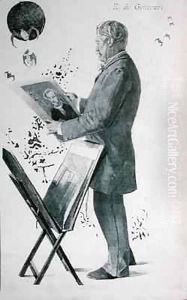Boileau Paintings
Nicolas Boileau, commonly referred to as Boileau-Despréaux to distinguish him from other members of his family bearing the same surname, was a French poet and critic born on November 1, 1636, in Paris, France. Although not a visual artist, Boileau is a significant figure in the history of French literature and criticism.
Boileau was the fifteenth child of Gilles Boileau, a clerk in the Grand Chambre of the Parlement of Paris. Despite his father's wish that he pursue a career in law, Boileau was drawn to literature and began to write poetry early in his life. He studied at the Collège d'Harcourt and later at the Sorbonne, where he focused on theology, though his passion remained in the literary arts.
His first major work, 'Satires' (published from 1660 onwards), criticized various aspects of society, including the literary world and the follies of the aristocracy. He gained notoriety with his 'Epistles' (published from 1669), which were moral and literary dissertations in verse. Boileau's most famous work, 'L'Art Poétique' (1674), is a prescriptive poetic treatise that mirrors the rationalist spirit of the age and the principles of classicism. It was highly influential in establishing the rules for good taste in literature and the arts during the era of Louis XIV, advocating for clarity, harmony, and order.
Apart from his poetry, Boileau's 'Les Héros de roman' (Heroic Romances, 1668) and his translation and commentary of Longinus's treatise 'On the Sublime' were significant in shaping neoclassical aesthetics. He became Historiographer Royal in 1677, sharing the title with his friend, the great French playwright Jean Racine.
Boileau's influence extended well beyond his lifetime, with his critical doctrines serving as a foundation for French literary criticism. He was a part of a circle of prominent writers that included Molière, Racine, and La Fontaine. Boileau remained a bachelor all his life, and his later years were marked by a religious piety that had been absent from his earlier satirical works. He died on March 13, 1711, in Paris. His work remains a testament to the classical spirit of the Age of Louis XIV and continues to be studied and appreciated for its wit, clarity, and critical acumen.
